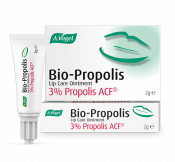An introduction to cold sores
Cold sores are painful, irritating, fluid filled blisters that occur around the lips. They affect approximately 1 in 5 people in the UK and those suffering from cold sores often find that they are a recurring, embarrassing problem.
Cold sores are caused by the cold sore virus otherwise known as the Herpes Simplex Virus 1 or HSV-1. This virus is one of two herpes viruses – cold sores are sometimes referred to as herpes labialis (‘herpes of the lips’) or oral herpes.
The other herpes virus, Herpes Simplex Virus 2 (HSV-2), is responsible for genital herpes commonly known simply as herpes. Although they belong to the same family, in general, HSV-1 and HSV-2 cause different problems.
Cold sores have been known as far back as around 2,000 years ago when the Roman Emperor Tiberius banned kissing because so many people were affected by the problem.
Cold sore symptoms
Cold sore symptoms tend to appear in a specific order of stages.
Cold sores appear as small, fluid-filled blisters found in red, inflamed or swollen areas of skin on the face. Although the lips are the main area affected, cold sores may also be found around the mouth or near the nostrils (external openings to the nose).
Cold sores may appear singly (alone) or in groups of two or three. Any similar looking blister on other areas of the body will not usually be termed a cold sore. The key symptom of cold sores is pain or tenderness in the blister itself or in the skin around the blister. Sometimes cold sores lead to irritation and swelling of the gums.
Read about the cold sore symptoms you can expect.
The recurrence of cold sores
Cold sores are a recurring problem and this is because the cold sore virus is difficult, if not impossible, to eradicate from the body.
Typically, the virus enters the body when a person is younger and commonly during childhood. This initial infection does not lead to any symptoms and after entering the body, the virus tends to remain in your body for the rest of your life, existing in a dormant or sleeping state.
However, certain situations encountered by the body can cause the virus to wake up. These are known as trigger factors and lead to a reactivation of the virus in the body.
For instance, a cold sore can develop if your immune system is weakened because of stress, lack of sleep, or because it has to fight off viruses causing a cold or flu. For more information on trigger factors, go to our page on cold sore causes.
A cold sore outbreak usually lasts between 5 and 21 days. Occasionally, the outbreak can be mild and short-lived – resolving after a couple of days.
After the cold sore has healed, the virus becomes dormant again until another trigger is encountered. When this happens, the cold sore recurs. If your immune system has a tendency to be weak, or if you encounter cold sore triggers often, you may become prone to recurring cold sore outbreaks.
Treatment of cold sores
Cold sores can resolve on their own without treatment. However, as outbreaks or attacks are often painful, inconvenient and embarrassing, many people suffering cold sores prefer to treat or better still, prevent them. There are several common home remedies which are thought to help with the treatment of cold sores, ranging from white spirit to raw garlic. However, many of these may be inconvenient, not to mention smelly, and there are other simpler treatments which you may find to be effective.
A number of cold sore treatments are available to help reduce the severity of symptoms and improve recovery time:
- Conventional medicines such as anti-viral creams are available from your doctor (on prescription) or from a pharmacy. These generally have to be used at the very early stages of the cold sore – at the first signs of a tingle
- Complementary treatments such as L-Lysine (an amino acid), vitamin C and bee-derived propolis based products have been used to treat the symptoms and prevent spread of the virus.
Read more about the conventional and complementary cold sore treatments available.
Preventing cold sores
There are a number of ways of lowering your risk of picking up or passing on a cold sore, avoiding recurrences.
Triggers for cold sores may differ from person to person. The following steps may help to avoid an outbreak:
- One of the most important triggers of cold sores is exposure to sunlight. If this is the case with you, try using a sun-block (above SPF-15) on your lips and other areas potentially affected by cold sores to prevent over-exposure to the sun
- Avoid using sun lamps or tanning lamps
- Treat the cold sore as early as possible - ideally at the first signs or the ‘tingle stage’
- Protect the lips from injury and avoid chewing or biting your lips
- Keep lips moisturised to avoid chapping or dryness
- Sleep well. Making sure you have enough rest helps strengthen your immune system. If you have trouble sleeping, you may wish to go to our page on sleep problems
- A healthy diet can improve the body’s defences which in turn, helps the immune system and prevents cold sores
- Consider relaxation therapy if you feel you are suffering from stress
- If you are feeling run-down, consider using herbs and supplements to help your immune system, such as Echinacea and vitamin C .
If you are suffering from a cold sore, take the following steps to prevent spread of the infection:
- Good hand hygiene stops the spread of cold sore viruses. Wash your hands before and after applying any topical (external) cold sore remedy such as a cream or ointment
- Do not pick the scab off your cold sore as this may cause infection or lead to scarring – both can trigger another cold sore
- Don’t share your cold sore treatment with others
- Avoid contact with those who have a low level of immunity such as new born babies, people suffering from illness or having treatment which lowers the strength of their immune response.
Complications of cold sores
These are rare, but it is important for anyone suffering from cold sores to be aware of them.
Possible complications of cold sores include:
- Infection by bacteria – this gives rise to pus and / or redness of the skin and cold sore
- A cold sore spreading to cover a large area eg. larger than a 1p coin
- Infection spreading into the mouth, on the hands, in the genital area or the genitals
- Infection by the cold sore virus near your eyes, or spread into the eyes and affecting vision
- Spread of the cold sore virus into skin that is already damaged or broken (eg. with eczema) leading to a skin infection
- Cold sore infections not healing after 14 days
- Frequent or recurrent attacks of cold sores
- Recurrent infection in those with a weakened immune system such as after chemotherapy or due to HIV infection
- Cold sores that fail to improve
- Severely painful cold sores
- Cold sores in babies and young children
If you notice any of the complications described above, seek the attention of a doctor or other qualified healthcare professional.





 Looking for our products in a store near you?
Looking for our products in a store near you?

